 |
 |
 |
TDLC's First MOOC Yields a Staggering Number of Students on Coursera!

TDLC's Dr. Terry Sejnowski and Visiting Scholar Dr. Barbara Oakley have put together a Massive Online Open Course (MOOC) for Coursera on "Learning How to Learn." TDLC's first venture into the MOOC arena with Coursera generated tremendous worldwide interest; when the MOOC launched in August 2014, 197,000 “learners” from over 206 different countries joined the month-long course. Due to its success, this MOOC was offered again in October 2014 with over 125,000 learners! According to Class Central, "Learning How to Learn" is currently the most popular MOOC of all 253 MOOCs from major universities around the world. Mark your calendars – it will be offered again in January 2015. More
|

TDLC Researcher Leanne Chukoskie Wins Qualcomm Seed Grant to Develop "NeuroGaming Center at UC San Diego"
The Qualcomm Institute at UC San Diego has given grants to 35 new projects that are part of the institute's Calit2 Strategic Research Opportunities (CSRO) program. The aim is to build clusters in brain, medical, and robotics research. Among the 35 winning proposals is TDLC researcher Leanne Chukoskie's project to develop a "NeuroGaming Center at UC San Diego". More
 TDLC Researchers Advocate for TDLC Researchers Advocate for
Science of Learning in Washington DC
During the week of Society for Neuroscience Annual Meeting in Washington DC this past November, TDLC scientists and trainees met with various elected officials and federal agency leadership to advocate for support for Science of Learning research, training, translation and STEM education and diversity initiatives. As the SLC program sunsets in 2016, we want to encourage elected officials, Congressional committee members, and agency leadership to continue support for this type of research, training and translation programming in the future. The National Science Foundation’s initial investment in this group of researchers and students/trainees has grown beyond expectation, has yielded tremendous scientific breakthroughs and benefits, and it is important to continue and build upon this success! More
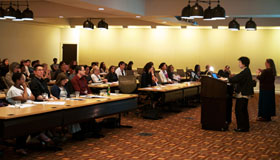
TDLC To Host iSLC 2015!
Each year, students and post docs from all six National Science Foundation Science of Learning Centers (SLCs) come together at the iSLC Conference to share their knowledge with each other in their quest to develop a transdisciplinary science of learning. This year, as in 2012, TDLC has been chosen to host the event. The conference gives early career researchers the opportunity to expand their networks and establish relationships with researchers at other SLCs, promoting cross-Center collaborations and the development of a shared vocabulary. Participants attend two days of scientific discussions, networking activities, poster sessions, and oral presentations. Click here to read highlights from iSLC 2012!
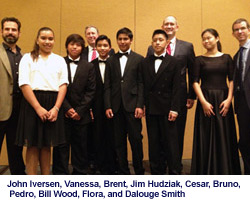 The Magic of Music: The Magic of Music:
TDLC researcher Dr. John Iversen gave a scientific talk on the SIMPHONY project at the American Academy of Child and Adolescent Psychiatrists on Oct. 25, 2014, in a session entitled "The Magic of Music: Bringing Science and the San Diego Youth Symphony Together at AACAP." The session focused on the role of music in leading to healthy child development and featured additional talks by Dalouge Smith, CEO of SD Youth Symphony, Dr. William Wood, and Dr. Jim Hudziak. The session ended with performances by Community Opus and SDYS performers who spoke movingly about the deeply positive impact music has had on their lives.
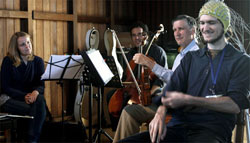
Team Assembled by Scott Makeig Wins $300K President's Research Catalyst Award (Dec. 10, 2014)
UC President Janet Napolitano announced the first five recipients, chosen from a pool of almost 200 proposals. Dr. Makeig's project brings together "UC experts on music listening, performance, neuroscience, brain imaging and data science to understand the transformative potential of music for health and cognition." More

Dart NeuroScience - TDLC Seminar Series Going Strong!
The generosity of Dart NeuroScience, LLC, has allowed us to launch our NEW 2014-2015 academic Seminar Series. Winter Quarter Speakers will include Gyorgy Buzsaki (NYU), Terry Jernigan (UCSD), John O’Keefe (UCL), Janet Wiles (UQueensland), Terry Sejnowski (Salk). Many thanks to our Fall Quarter Speakers James McClelland (Stanford), Garrison Cottrell (UCSD), Alexander Khalil (UCSD), Douglas Nitz (UCSD), and Patricia Churchland (Salk). The Seminar Series continues through August 26, 2015, with seminars being held each month, every other Wednesday from 3:00 - 4:00 PM/PST, at the Sanford Consortium/Duane J. Roth Auditorium, in La Jolla, California. Talks will also be broadcast by Webinar, with archived webinars available on the TDLC website after the events.
|
|

|
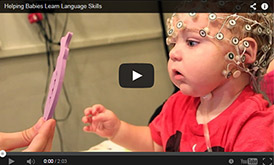 TDLC Investigator April Benasich and her Team Have Found a Way to Boost Listening Skills in Infants as Young as Four Months Old TDLC Investigator April Benasich and her Team Have Found a Way to Boost Listening Skills in Infants as Young as Four Months Old
TDLC's April Benasich, Director of the Infancy Studies Laboratory at the Center for Molecular and Behavioral Neuroscience, and her colleagues at Rutgers University have found a way to boost listening skills in babies by rewarding them for paying attention to tiny bursts of sound. Their study, recently published in the Journal of Neuroscience, describes a series of 8-10 minute experiments performed with babies ages four to seven months old that help babies organize the brain pathways that will help them perceive language. Read the publication! Additional articles:
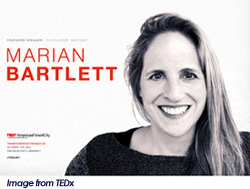 TDLC Investigator Marian Bartlett, PhD, Co-Founder & Lead Scientist of Emotient, gave a TEDx talk on October 11, 2014, at the Transformation Through Us event held at San Diego State University. TDLC Investigator Marian Bartlett, PhD, Co-Founder & Lead Scientist of Emotient, gave a TEDx talk on October 11, 2014, at the Transformation Through Us event held at San Diego State University.
Dr. Bartlett spoke about Emotion Aware Machines. Computers that can recognize emotions will transform the way people interact with technology, enabling richer connections between man and machine. Dr. Bartlett demonstrated novel technology that can recognize facial expressions in real-time, using any standard camera. Imagine machines that can predict our intentions. By measuring facial expression, we have access to the emotions that drive our decisions.
|
|
|
| |
| |
|
This message was sent from:
The Temporal Dynamics of Learning Center (TDLC.UCSD.EDU)
University of California, San Diego,
9500 Gilman Drive, La Jolla, CA 92093
To learn more about TDLC, please visit us on the web at: TDLC.UCSD.EDU
Please contact webmaster@tdlc.ucsd.edu to unsubscribe.
TDLC is a Science of Learning Center (SLC),
one of six SLCs funded by the National Science Foundation. NSF grant #SBE-0542013
|
|
 |
 |
 January 2015 January 2015
|
 |
Contact Us |
 |
TDLC Website |
 |
About TDLC |
 |
7th Annual San Diego Brain Bee
Date: Jan. 24, 2015 |
 |
TDLC All-Hands Meeting 2015
Dates: Feb. 27-28, 2015 |
 |
Dart NeuroScience - TDLC Seminar Series
Dates: Sept. 10, 2014 through Aug. 26, 2015, Time: Held every other Wednesday from
3:00-4:00 pm. |
 |
Perceptual Expertise Network (PEN)
30th Workshop
May 14, 2015
Tradewinds Island Resorts, St. Pete Beach, Florida
|
|
 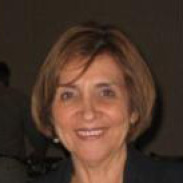
TDLC's The Educator Network
Recent
Forum Topic:
Kids And Screen Time: What Does The Research Say?
Researchers at UCLA reported that students with no access to electronic devices for five days were better able to read human emotions and nonverbal cues than their peers who had access to technology. Researchers say this is a "big takeaway" for schools. More
|
|
|
 |
 |
Brain Research Shows Different Pathways Are Responsible for Person and Movement Recognition (1/13/15, HealthCanal)
Dr. Marlene Behrmann featured. More
|
 |
NeuroGrid Can Capture Activity of Individual Neurons From Brain Surface
(12/30/14 MedicalResearch.com) Interview with Dr. Buzsáki. More
|
 |
Ipsen and the Salk Institute renew their agreement for discovery research in medical sciences
(Business Wire, 11/18/14)
TDLC's Fred Gage is an active Investigator of the Salk-Ipsen Life Sciences Program.
Read More
|
 |
The Brain’s “Inner GPS” Gets Dismantled
UCSD News Center, 11/14/14)
TDLC Investigators Robert Clark and Larry Squire are part of the study, which builds upon the Nobel Prize-winning science about "place cells."
Read More
|
 |
EEG Test to Help Understand and Treat Schizophrenia
(UCSD News Center, 10/29/14)
Researchers at UC San Diego School of Medicine have validated an EEG test to study and treat schizophrenia. TDLC's Dr. Scott Makeig is co-author of one of the cited studies.
Read More
|
 |
UC San Diego bolsters reputation as top neuroscience research center with more than $10 million in new federal grants (UCSD News Center, 10/9/14).
TDLC Co-Directors Terry Sejnowski and Andrea Chiba are featured in the article.
Read More
|
 |
Tracking Brainwaves
(Triton UCSD Alumni Pub., 9/14)
A $1.8 million NSF project led by INC researcher Gert Cauwenberghs promises to improve our understanding of how the brain controls the body. His team is working with Cognionics, and using a statistical analysis method developed by TDLC's Tim Mullen and Christian Kothe at the UC San Diego Swartz Ctr. for Computational Neuroscience (SCCN).
More
|

|
Left Brain vs. Right:
It's a Myth
Many people believe that logical, analytical people are left-brain dominant, while creative and artistic types are right-brain dominant. But science has never really supported this concept.
Recently, scientists at the University of Utah debunked the myth. They analyzed more than one thousand brains, and found no evidence that people prefer using their left or right brain. Instead, they found that all of the study participants were using their entire brain equally, throughout the course of the experiment. More 
(*reference: LiveScience) |
|
|
|
 |

![]()
